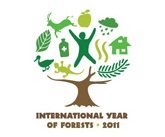 The UN General Assembly declared 2011 the International Year of Forests to raise awareness on sustainable management, conservation and sustainable development of forests. The International Year of Forests was officially launched on 2 February 2011 at the UN headquarters in New York, USA, during the UN Forum on Forests. Events will be held globally throughout 2011 showcasing actions towards managing the world's forests sustainably.
The UN General Assembly declared 2011 the International Year of Forests to raise awareness on sustainable management, conservation and sustainable development of forests. The International Year of Forests was officially launched on 2 February 2011 at the UN headquarters in New York, USA, during the UN Forum on Forests. Events will be held globally throughout 2011 showcasing actions towards managing the world's forests sustainably.
The UN has a website dedicated to Forest 2011, where you will find information regarding events being organised throughout the year, as well as interactive web tools and resources to promote dialogue on forests. Participants can also tell organizers via the website how they plan to celebrate “forests for people” during 2011, so that they may showcase their stories and initiatives through this website.
Unfortunately, the Labour Party opposition motion against the UK government proposal to sell-off the remaining forests in England to the public sector, which coincided with the launch of the International Year of Forest, was defeated by 310 to 260. This means the UK government can sell-off all of the remaining England’s public forests to private buyers to raise £100 million. Labour argued that the value of the services provided by England’s public forest estate is estimated to be £680 million a year and could increase in the future through the transition to a low carbon economy as a carbon market emerges. This means the government will actually lose money by selling off the remaining forests in England.
The Forestry and Timber Association lists a broad range of non-market benefits of forests currently recognised in Britain, which include:
- open-access non-priced recreation and leisure activities
- landscape, amenity and countryside characterization
- biodiversity
- valuable habitats
- measurable benefits in physical and mental health
- carbon sequestration
- absorption of air, water and noise pollutants
- management of water resources
- protection of archaeological features and historic sites
- provision of opportunities for education, community activities and social inclusion
- regeneration and improvement of brown-field sites
If private sector companies become the owners of England’s forests and keep them as forests, would they keep them open-access for recreation and, more importantly, for education provision? I doubt it!
Link to UN Forests 2011 website and events. The website has a slideshow of photos related to forests, which includes a lot of interesting facts. For example, forests cover 31% of the world’s total land area and 36% of these are primary forests.
Link to ConservativeHome blog about the labour motion to stop the government plan to sell-off forests in England.
Link to prepared search (for Cabi's Environmental Impact subscribers) using the terms: forest management AND forest policy AND multiple use, which includes 635 records from the CAB abstracts database and 9 books.
To find out more about the campaign to save the English forests, visit 38 degrees' save our forests action centre, where nearly 450,000 people signed a petition to try and stop the UK government from selling off the remaining forests in England.
Reference
Forestry and Timber Association (FTA) (2004) Fast Forwarding Forestry: Manifesto Action Group on Climate Change and Non-Market Benefits. FTA, Edinburgh, UK.
2 Comments
Leave a Reply

I hope UN’s Year of Forest is not just a mere political celebration to calm the people down from the growing ecological threat.
I hope UN’s Year of Forest is not just a mere political celebration to calm the people down from the growing ecological threat.